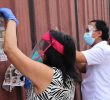DAVAO CITY, Philippines – Petitions against the Anti-Terrorism Act of 2020 have grown in numbers and now totals seven since it was approved into law.
The latest to join the growing list are labor rights groups which raised concerns on how the measure will affect unionists and labor rights defenders in the country.
The Center for Trade Union and Human Rights (CTUHR) and Pro-Labor Legal Assistance Center filed before the Supreme Court the seventh petition questioning the legality of the Republic Act 11479 or Anti-Terrorism Act of 2020 on Thursday, July 9.
On July 8, framers of the 1987 Constitution Christian Monsod and Felicitas Arroyo filed the sixth petition. They were joined by Ateneo and Xavier law professors, Jesuit priest Albert Alejo, the Ateneo Human Rights Center, and labor federation Sentro ng mga Nagkakaisa at Progresibong Manggagawa.
The fifth petition was submitted by lawyer Rudolf Philip Jurado, President Rodrigo Duterte’s former government corporate counsel, also on July 8.
READ: Four petitions from lawyers’ groups challenge Anti-Terror Law at Supreme Court
The CTUHR noted that for four consecutive years, the Philippines has been consistently tagged as one of the “most dangerous” countries for workers through the Global Rights Index by the International Trade Union Confederation.
They slammed that a “record-high” of 50 workers, unionists, and labor rights defenders have been killed under the Duterte administration.
“Because of the vague definition of terrorism and the absolute power it gives the state forces, this law can definitely be used against the labor movement,” the CTUHR said in a statement posted on its Facebook page.
“Throughout history, unionists and labor rights defenders have been perpetrated by filing trumped-up charges against them, red-tagging, accusing them of being rebels or terrorists, and other forms of harassment,” they added.
Their group believed that RA 11479 “will worsen the struggles of workers in pushing for their rights and demands.”
Duterte’s defense
President Rodrigo Duterte, in a taped public address aired on the wee hours of Wednesday morning, July 8, defended the signing of the law, saying it is a “much-needed” legal weapon to fight terrorism in the country. He also cited the bombing incidents that happened mostly in Mindanao.
In the same speech, Duterte stressed the communist rebels in the country as “terrorists” under the newly signed law.
“They would like to be treated with another set of laws. When as a matter of fact, they are terrorists…because we – I finally declared them to be one,” Duterte said, adding that most of his days as a President, he was trying to figure out and connect with the Communists, on how a peaceful solution can be achieved.
The peace talks between the Philippine government and the National Democratic Front of the Philippines collapsed after both sides accused each other of ceasefire violations. It followed with the government’s petition seeking to declare the Communist Party of the Philippines, and its armed wing, the New People’s Army, as terrorist organizations, which is still pending in a local court.
Despite fears from various sectors that the law is prone to abuse and could infringe fundamental rights, Duterte said that “law-abiding” citizens should not fear the law.
But even for United Nations Commissioner for Human Rights Michelle Bachelet, the anti-terror law has its “chilling effects” on human rights and humanitarian work.
A recently published communication to the Philippine government by nine UN experts also raised concerns over the anti-terror law. (davaotoday.com)










